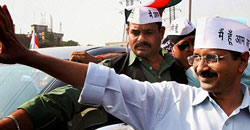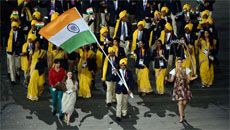Narendra Modi has redefined the face of Indian politics with his massive victory in 2014 general elections. The controversial Hindu nationalist crushed Congress’ decade-long grip of the nation and secured the most decisive mandate that any political party has received since the 1984 assassination of Prime Minister Indira Gandhi that drove her son Rajiv Gandhi to office.
The 2014 general elections in India were very much like a one-man show. Whether it was the media debating political policies, or the common man discussing political figures, Narendra Damodardas Modi was the showstopper on the 2014 political stage. Critics are questioning what the fate of Bharatiya Janata Party (BJP) would have been if Modi had not spearheaded the party's campaigning across the country. True or not, another major factor contributing to BJP's victory was a corruption-struck economy that reigned under the UPA for 10 years and ultimately translated in the worst ever defeat of the Indian National Congress.
When India voted in the 2014 general elections, it was a case of the BJP coming back into power after almost a decade, but more importantly, it was an event of India rejecting a Rahul Gandhi led Congress. More than anything else, these general elections were a wakeup call for politicians and parties that campaigned in the name of caste and communalism. It can also be seen as a shift from the long prevailing dogma that communalism can be a dominant factor in winning votes. In these elections, India rose to look beyond this belief and conferred executive powers to the man who faced intense national and international backlash for allegedly being unable to halt the 2002 Gujarat carnage that killed more than 1,000 individuals, a majority of them Muslims.
The Modi Tsunami crushed Congress’ decade long grip of the nation and secured the most decisive mandate that any political party has received since the 1984 assassination of Prime Minister Indira Gandhi that drove her son Rajiv Gandhi to office.
Aam Aadmi Party (AAP) leader and former Chief Minister of New Delhi, Arvind Kejriwal competed with the likes of the Congress and BJP in the general elections but only managed to make advancements in Punjab by winning four seats: Sangrur, Patiala, Faridkot and Fatehgarh Sahib.
Modi : A Step Ahead
The 63-year-old Modi was in all aspects leading a campaign that collaborated technology and style, thus reaching out to the youth and achieving maximum participation from their part. The use of hologram technology allowed Modi to deliver approximately 100 speeches at one time, as per his website. Modi was also one of the early birds among Indian politicians to employ digital media in order to reach out to citizens. He has a running website; his Twitter account has over 5.07M followers and his presence on Facebook is escalating every day.
Congress’ undeclared PM candidate Rahul Gandhi, on the other hand, has kept himself aloof from social media and does not have a website either. "Congress simply led a poor campaign. It failed to appreciate the importance of young voters; it had a very modest presence on social media, while the BJP—including Modi himself—were very active on it. Ironically, Modi was seen as more in touch with Pakistani youth than was Congress’ Rahul Gandhi, who is significantly younger than Modi," says Michael Kugelman, Senior Program Associate for South and Southeast Asia at Woodrow Wilson International Center for Scholars.
India's anti-corruption campaigner-turned politician and former Chief Minister of New Delhi, Arvind Kejriwal is someone that has maintained a strong presence on social media and has efficiently employed it in the execution of his movement against corruption. Kejriwal is regularly using Twitter and Facebook to communicate with his supporters and informing them about the AAP's movement.
From Visa Denial to Diplomatic Immunity
The gruesome Gujarat riots that killed more than 1,000 individuals, a majority of them Muslims, were a major controversy that besmirched Modi’s influence in the international arena and he became an international pariah. Nearly a decade ago, Modi was denied US visa just as he was preparing to travel to New York to address Indian-Americans at a rally scheduled at Madison Square Garden. Canada, United Kingdom and Australia were other nations where Modi was essentially a persona non grata. However, during British PM David Cameron's recent visit to India, the UK government invited Modi to address the British House of Commons. Now, upon becoming PM, the visa ban has been uplifted and the leader will enjoy diplomatic immunity on his visits abroad.
India – US Ties
“I think that the US will expect Modi to help repair a relationship that has really floundered in recent years. Modi is seen as a pro-trade, pro-investment kind of leader, and Washington will see him as someone who can help address the trade-related aspects of bilateral tensions, which have become quite significant in recent years as both countries have passed legislation that the other believes is protectionist,” says Kugelman.
Political expert Kugelman delineates the future framework of India-US ties. He says the minister will make efforts to create a more conducive investment environment in India for American investors “by reducing the long periods of time it takes for foreigners to start businesses. Perhaps he’ll even make efforts to provide more litigation protection to American energy corporations. The lack of such protection, to this point, have kept many Americans from taking advantage of the civil nuclear accord between the two nations, which permits US companies to provide civilian nuclear materials to India,” explains Kugelman.
India – Canada Ties
Canada has been a key player at the Vibrant Gujarat Summit, a biennial summit organized by the state government to draw foreign investment for the development of Gujarat. Canada was a partner country for the 2013 summit and Employment Minister Jason Kenney, who was then the Immigration Minister, headed the delegation. Kenney was quoted as saying: “Just as Gujarat has the strongest economy in India, Canada has the strongest economy in the G-7. Working together, the potential to support each other’s prosperity is boundless.”
Although it would be quite early to predict how India – Canada ties would be affected with Modi coming into power at the centre, experts are suggesting that Canada could well be in place to penetrate into the Indian market with its large and important energy sector. Likewise, Canada also poses a potential end for Indian investors looking to invest in the energy resources, according to Rupa Subramanya, consulting editor for Business Standard, an Indian business daily.
Relations with South Asia
Modi is keen on fostering stronger ties with neighbouring nations and this was evident with the invitation of SAARC (South Asian Association for Regional Cooperation) nations to his oath-taking ceremony.
Kugelman says Modi will make major efforts to improve relations with these countries (Pakistan and China) through economic diplomacy. “In Pakistan, he will likely push for a formalized trade relationship. And in China, he will build on the various visits he made to China while [he was] Chief Minister of Gujarat.” Political pundits are also pointing out that the BJP led coalition – NDA (National Democratic Alliance), will take a tougher stand on the recent border conflicts with Pakistan and China, as compared to the Congress led alliance – UPA (United Progressive Alliance). In their term as the official Opposition, the NDA have continuously criticized the UPA, alleging leniency in dealing with border conflicts in their regime.
“There will be a greater emphasis on pursuing economic partnerships across South Asia, and beyond. At the same time, there will also be a more nationalistic side to India’s foreign relations—it will not tolerate provocations in the way that the last government did, and it will push harder to have its interests represented in global forums—including in international negotiations over trade and climate change,” Kugelman remarks.
Challenges
The biggest challenge would be to revive a plummeting economy and execute the well-lauded Gujarat model across the whole nation. The Indian electorate that gave Congress a decade of governance has now left them in a state where they don’t even have the required seats to form the official Opposition in the Indian parliament. Indians are eager for a swift and effective change, a change that would remove them from inflation, unemployment and most importantly corruption. Expectations are high and patience is low. Women safety is another major concern that Modi will have to address. With rape cases now making headlines internationally, the government needs to configure strict laws that can be enforced in a time-bound manner.
From what political experts are suggesting and what Modi’s history indicates, this Hindu nationalist leader appears to be a major player in Indian national politics. After over two months in office, this leader who is also seen as a technocrat has emphasized the need of better governance, efficient delivery and implementation. In the second meeting of his Cabinet, Modi outlined the top 10 policy priorities for his government and also asked his ministers to fix a timetable of priorities for the first 100 days. Kugelman describes this political personality by saying, “Interestingly, there is something distinctly “American” in Modi’s own life story. He represents a rags-to-riches, Horatio Alger-type success story—from tea seller’s son to national leader—who embraced free markets and decisive decision-making to become a supremely successful professional.”




